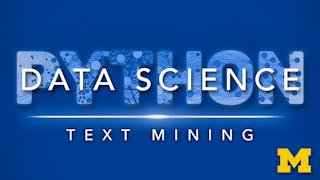This course will cover the major techniques for mining and analyzing text data to discover interesting patterns, extract useful knowledge, and support decision making, with an emphasis on statistical approaches that can be generally applied to arbitrary text data in any natural language with no or minimum human effort.

Cultivate your career with expert-led programs, job-ready certificates, and 10,000 ways to grow. All for $25/month, billed annually. Save now


Text Mining and Analytics
This course is part of Data Mining Specialization

Instructor: ChengXiang Zhai
72,808 already enrolled
Included with 
(734 reviews)
Skills you'll gain
Details to know

Add to your LinkedIn profile
14 assignments
See how employees at top companies are mastering in-demand skills

Build your subject-matter expertise
- Learn new concepts from industry experts
- Gain a foundational understanding of a subject or tool
- Develop job-relevant skills with hands-on projects
- Earn a shareable career certificate


Earn a career certificate
Add this credential to your LinkedIn profile, resume, or CV
Share it on social media and in your performance review

There are 7 modules in this course
You will become familiar with the course, your classmates, and our learning environment. The orientation will also help you obtain the technical skills required for the course.
What's included
2 videos5 readings2 assignments1 plugin
During this module, you will learn the overall course design, an overview of natural language processing techniques and text representation, which are the foundation for all kinds of text-mining applications, and word association mining with a particular focus on mining one of the two basic forms of word associations (i.e., paradigmatic relations).
What's included
9 videos1 reading2 assignments
During this module, you will learn more about word association mining with a particular focus on mining the other basic form of word association (i.e., syntagmatic relations), and start learning topic analysis with a focus on techniques for mining one topic from text.
What's included
10 videos1 reading2 assignments
During this module, you will learn topic analysis in depth, including mixture models and how they work, Expectation-Maximization (EM) algorithm and how it can be used to estimate parameters of a mixture model, the basic topic model, Probabilistic Latent Semantic Analysis (PLSA), and how Latent Dirichlet Allocation (LDA) extends PLSA.
What's included
10 videos2 readings2 assignments1 programming assignment
During this module, you will learn text clustering, including the basic concepts, main clustering techniques, including probabilistic approaches and similarity-based approaches, and how to evaluate text clustering. You will also start learning text categorization, which is related to text clustering, but with pre-defined categories that can be viewed as pre-defining clusters.
What's included
9 videos1 reading2 assignments
During this module, you will continue learning about various methods for text categorization, including multiple methods classified under discriminative classifiers, and you will also learn sentiment analysis and opinion mining, including a detailed introduction to a particular technique for sentiment classification (i.e., ordinal regression).
What's included
7 videos1 reading2 assignments
During this module, you will continue learning about sentiment analysis and opinion mining with a focus on Latent Aspect Rating Analysis (LARA), and you will learn about techniques for joint mining of text and non-text data, including contextual text mining techniques for analyzing topics in text in association with various context information such as time, location, authors, and sources of data. You will also see a summary of the entire course.
What's included
8 videos1 reading2 assignments1 plugin
Instructor

Offered by
Recommended if you're interested in Data Analysis


Yonsei University


O.P. Jindal Global University


University of Michigan


University of Illinois Urbana-Champaign
Why people choose Coursera for their career




Learner reviews
734 reviews
- 5 stars
68.52%
- 4 stars
20.29%
- 3 stars
7.49%
- 2 stars
2.04%
- 1 star
1.63%
Showing 3 of 734
Reviewed on Jun 24, 2017
very theoretical. very insightful too. finally got a glimpse how the features that I took for granted took shape ... thanks to the instructor, I love the textbook as well ~
Reviewed on Jul 22, 2017
The workflow is clear and the professor speaks to the students directly about all aspects without skimming the material.
Reviewed on Dec 3, 2022
Prof. Zhai's textbook is well-worth the added investment. His Coursera lectures helped me to "read between the lines."
New to Data Analysis? Start here.

Open new doors with Coursera Plus
Unlimited access to 10,000+ world-class courses, hands-on projects, and job-ready certificate programs - all included in your subscription
Advance your career with an online degree
Earn a degree from world-class universities - 100% online
Join over 3,400 global companies that choose Coursera for Business
Upskill your employees to excel in the digital economy
Frequently asked questions
Access to lectures and assignments depends on your type of enrollment. If you take a course in audit mode, you will be able to see most course materials for free. To access graded assignments and to earn a Certificate, you will need to purchase the Certificate experience, during or after your audit. If you don't see the audit option:
The course may not offer an audit option. You can try a Free Trial instead, or apply for Financial Aid.
The course may offer 'Full Course, No Certificate' instead. This option lets you see all course materials, submit required assessments, and get a final grade. This also means that you will not be able to purchase a Certificate experience.
When you enroll in the course, you get access to all of the courses in the Specialization, and you earn a certificate when you complete the work. Your electronic Certificate will be added to your Accomplishments page - from there, you can print your Certificate or add it to your LinkedIn profile. If you only want to read and view the course content, you can audit the course for free.
If you subscribed, you get a 7-day free trial during which you can cancel at no penalty. After that, we don’t give refunds, but you can cancel your subscription at any time. See our full refund policy.
More questions
Financial aid available,

